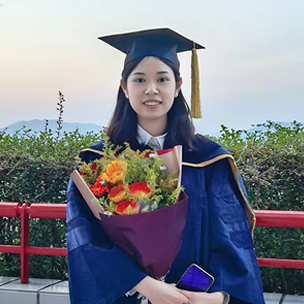
Dr Zhenjing Liu
Postdoc
The Hong Kong University of Science and Technology
My name is Zhenjing Liu, and I am from Guangxi Province in mainland China. I got my bachelor’s degree in Materials Science and Engineering from Shanghai Jiao Tong University. After that, I moved to Hong Kong and got my master’s degree and PhD degree both in Chemical and Biomolecular Engineering from the Hong Kong University of Science and Technology. During that period, I was the scholar of Asian Future leadership Program and awarded for the prestigious HKJEBN Scholarship for Talent. My research mainly focusses on the controllable synthesis of low-dimensional materials and exploring their potential applications in energy area. Now, I am a post[1]doctoral fellow in HKUST. I am looking forward to attending the Rising Stars in Engineering Workshop. It will be a great opportunity for me to learn from the outstanding female engineers and scholars from all over the world and make plan for my own academic career.
Controlled Synthesis of Two-dimensional Layered Metal Chalcogenides for Energy Application
Two-dimensional (2D) layered metal chalcogenides (LMCs) have attracted significant research attention for their potential application in energy storage and conversion. However, the understanding of reaction mechanism remains challenging and hurdles the rational design of the structure. This thesis presents strategies to realize the controlled synthesis of 2D LMCs for enhanced electrochemical performance. With the assist from theoretical studies and advanced characterization, we unveil the origin of their electrochemical performance and explore the underlying mechanism referring to the reaction sequence, reversibility, and kinetics. Briefly, the following three topics are covered: 1) Carbon-sandwiched SnS2 nanosheets are fabricated through a hydrogel-embedding method and demonstrate excellent sodium storage properties. The operando characterizations reveal the high reversibility of the redox reactions as well as the irreversible nanostructure evolution, indicating the significance of engineered carbon support in ensuring the electrode structure stability. 2) We explore the hydrogen evolution reaction on the basal plane of MoTe2 in both 1T′ and 2H phase, enhanced by creating anion vacancies by combining computational predictions followed with experimental validation. 3) Through a temperature-dependent chalcogenide substitution reaction, we are able to fabricate a sub-centimeter scale symmetric MoS2/MoTe2(1-x)S2x/MoS2 heterostructure with tunable chemical composition. A Te vacancy-initiated and S diffusion-mediated mechanism is proposed, and verified by the cross-section observation from scanning transmission electron microscope and DFT. The strategies we have developed and the mechanism we have elucidated in this thesis will provide the new paradigm for material synthesis and guideline for the future design of the advanced catalysts and electrodes